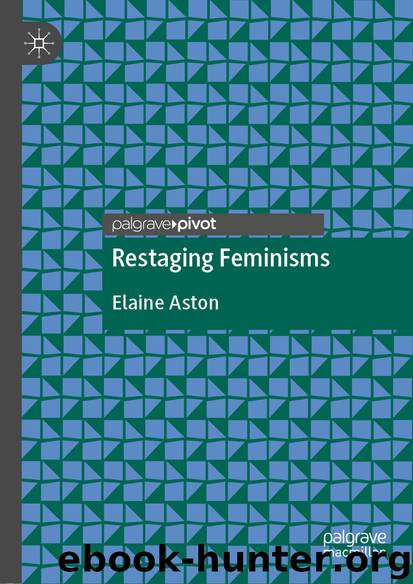Restaging Feminisms by Elaine Aston

Author:Elaine Aston
Language: eng
Format: epub
ISBN: 9783030405892
Publisher: Springer International Publishing
‘Muscle Memory’ of Radical-Feminist Rage: Emilia
Where my other case-study choices were informed by prior knowledge and expectations of what each production might yield regarding the idea of restaging feminisms, Emilia was an unexpected discovery. The playwright Morgan Lloyd Malcolm was not on my feminist-theatre radar; historically themed new dramas are not what I would normally seek out; and there were my reservations about a canonical, Shakespearean culture, even though a cursory glance at the publicity alerted me to the promise of a feminist intervention into the life and Shakespearean times of the poet Emilia Bassano. So, imagine my joy when Emilia turned out to be an exuberant and passionate voicing of radical feminism. It is never easy ‘to pin down any feeling of joy’, writes Lynne Segal, ‘seeing how easily pleasure mixes with sorrow’, but ‘what is most distinctive about moments of joy is that, tending to arrive unexpectedly, they raise us altogether above our routine concerns’ (2017: 44). The unexpected, joyous discovery of Emilia during my academic ‘routine’ of researching and writing this book is what lead to its inclusion in this chapter.
The play itself produces an uneasy mix of ‘pleasure’ and ‘sorrow’: the joy that derives from the power of women acting together and women’s power of acting diminished by patriarchy. Spinoza posits three ‘primitive’ or primary affects to which all other affects are related: joy, sadness and desire (1996: 101). Of the three, desire is identified as constituting our determination ‘to do something’; a desire to ‘act’ is shaped by ‘external causes’ that give rise to the ‘passions’ of joy or sadness in accordance with how a desire is positively or adversely affected (ibid.: 100). In its writing and staging, the desire for women’s stories to move centre stage drives the action of Emilia; joy and sadness oscillate as Emilia Bassano (1569–1645), a woman determined to write and see her poetry in print, struggles against the patriarchalism of her time that is also, Malcolm makes clear, our time. The play’s triangulation of desire, joy and sadness will inform my analysis of the show’s radical-feminist dynamics, but first I need to outline the background to the production. Given my uninformed discovery and unanticipated pleasure of Emilia, these are details which I pieced together after the event.
What I discovered about Malcolm’s writing career is that it exemplifies the difficulty of getting established as a playwright and pursuing a writing profession without substantial means—hardships that increased after the birth of her two children and the juggling of theatrical labour with maternal labour. Briefly, she began her career by collaborating with women on comedic pieces for the Edinburgh fringe; participated in the inaugural year of the Old Vic’s ‘New Voices’ scheme (2005); worked on community shows; and found employment team-scripting pantomimes at the Lyric Hammersmith (Malcolm 2019b). Whatever theatre work she took on was subsidised by other jobs, a characteristic of the industry that Malcolm insists needs to change: ‘We’ve managed to get other jobs to cover the fact we’re not being paid very well by what we are doing within the industry.
Download
This site does not store any files on its server. We only index and link to content provided by other sites. Please contact the content providers to delete copyright contents if any and email us, we'll remove relevant links or contents immediately.
Call Me by Your Name by André Aciman(20515)
Ready Player One by Cline Ernest(14675)
How to Be a Bawse: A Guide to Conquering Life by Lilly Singh(7486)
Wiseguy by Nicholas Pileggi(5784)
The Kite Runner by Khaled Hosseini(5178)
On Writing A Memoir of the Craft by Stephen King(4943)
Audition by Ryu Murakami(4930)
The Crown by Robert Lacey(4814)
Call me by your name by Andre Aciman(4683)
Gerald's Game by Stephen King(4654)
Harry Potter and the Cursed Child: The Journey by Harry Potter Theatrical Productions(4506)
Dialogue by Robert McKee(4403)
The Perils of Being Moderately Famous by Soha Ali Khan(4220)
Dynamic Alignment Through Imagery by Eric Franklin(4217)
Apollo 8 by Jeffrey Kluger(3708)
The Inner Game of Tennis by W. Timothy Gallwey(3687)
Seriously... I'm Kidding by Ellen DeGeneres(3633)
How to be Champion: My Autobiography by Sarah Millican(3593)
Darker by E L James(3516)
